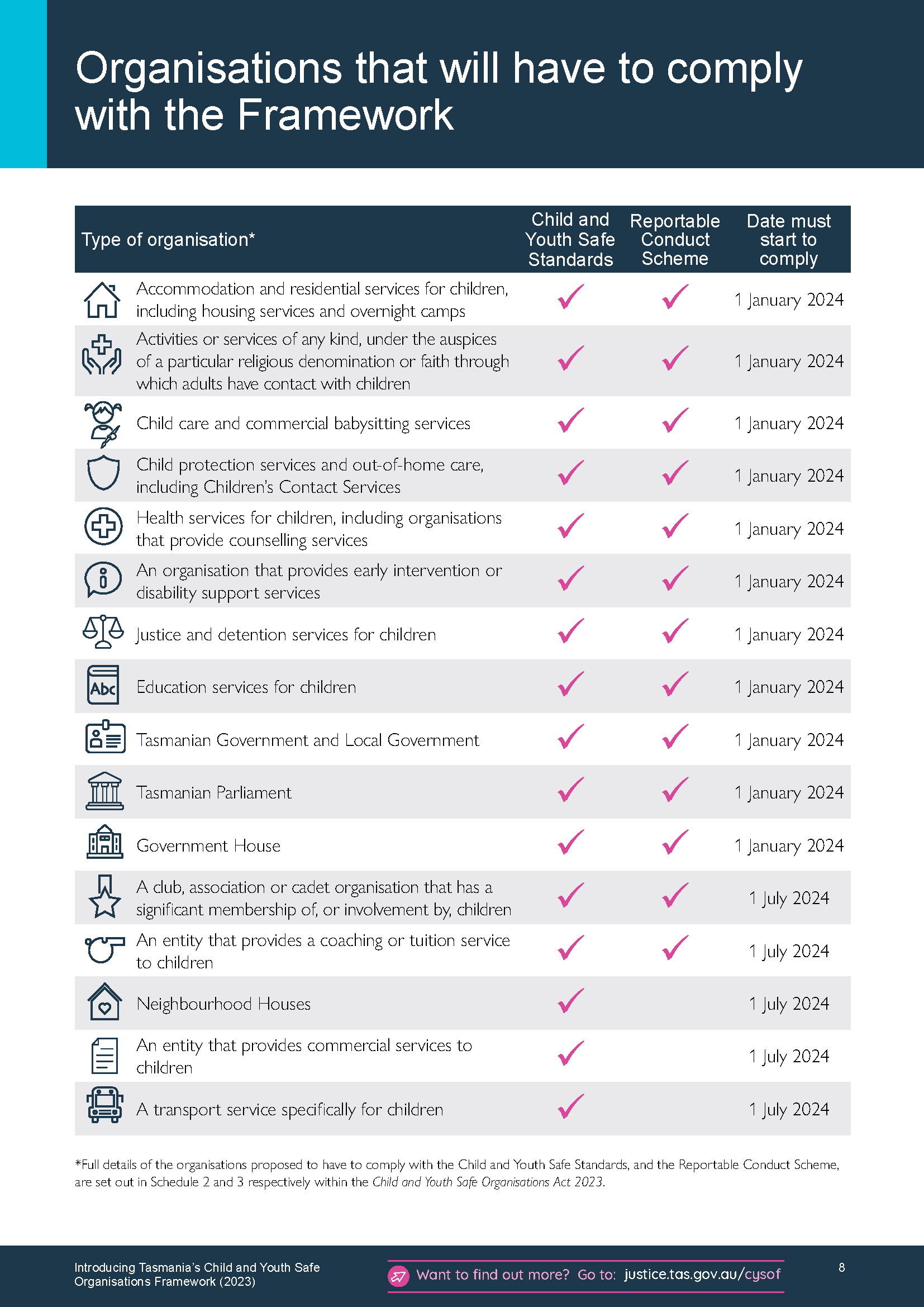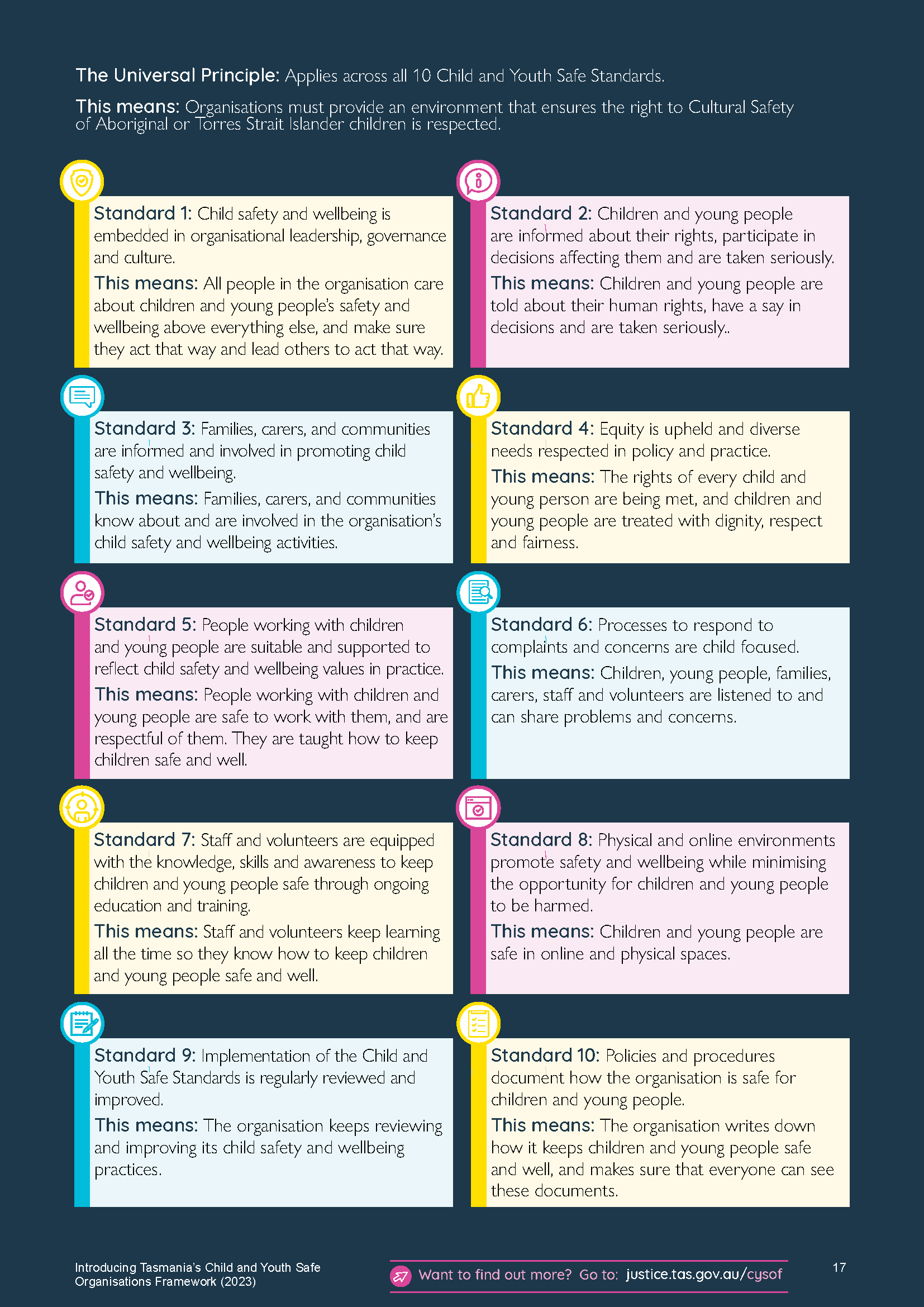The Royal Commission into Institutional Responses to Child Sexual Abuse identified national principles that would be rolled out across States and Territories in Australia. The Tasmanian Government have developed the Child and Youth Safety Organisational Framework to outline the expected organisations that need to comply with the new laws outlined in the Child and Youth Safe Organisations Act 2023.
This Act is now law and there are a range of businesses and organisations that are by law required to now comply with the 10 Child and Youth Safe Standards, and the overarching national Universal Principle.
Who needs to comply with the Framework?
- Accommodation and residential services for children, including housing services and overnight camps
- Activities or services of any kind, under the auspices of a particular religious denomination or faith through which adults have contact with children
- Child care and commercial babysitting services
- Child protection services and out-of-home care, including Children’s Contact Services
- Health services for children, including organisations that provide counselling services
- An organisation that provides early intervention or disability support services
- Justice and detention services for children
- Education services for children
- Tasmanian Government and Local Government
- Tasmanian Parliament
- Government House
- A club, association or cadet organisation that has a significant membership of, or involvement by, children
- An entity that provides a coaching or tuition service to children
- Neighbourhood Houses
- An entity that provides commercial services to children
- A transport service specifically for children
Introducing-Tasmanias-Child-and-Youth-Safe-Organisations-Framework
- see page 8:

What are the Child and Youth Standards
The National Principles include 10 Standards that all the applicable organisations must adhere to.
In addition, there is a Universal Principle that applies right across Australia.
Child and Youth Safe Standards
- Child safety and wellbeing is embedded in organisational leadership, governance and culture.
- Children and young people are informed about their rights, participate in decisions affecting them and are taken seriously.
- Families, carers, and communities are informed and involved in promoting child safety and wellbeing.
- Equity is upheld and diverse needs respected in policy and practice.
- People working with children and young people are suitable and supported to reflect child safety and wellbeing values in practice.
- Processes to respond to complaints and concerns are child focused.
- Staff and volunteers are equipped with the knowledge, skills and awareness to keep children and young people safe through ongoing education and training.
- Physical and online environments promote safety and wellbeing while minimising the opportunity for children and young people to be harmed.
- Implementation of the Child and Youth Safe Standards is regularly reviewed and improved.
- Policies and procedures document how the organisation is safe for children and young people.
Introducing-Tasmanias-Child-and-Youth-Safe-Organisations-Framework
- see page 17:


It is often said that “it takes a village to raise a child”. Council’s infrastructure is in many ways that village, from playgrounds, parks, and gardens to public spaces and community facilities.
All of us need to play a role in keeping children and young people safe from harm and abuse.
The Council has adopted a policy that provides commitment that as an organisation, we take our role in protecting our children and young people’s safety seriously, both in the physical environment and online.
The policy requires all employees and volunteers to meet Child and Youth Safe Standards regardless of their role..
We have embedded these requirements in our Code of Conduct for Employees to ensure that our people model the appropriate behaviours.
By implementing this, it means that all members of our organisation will take this matter seriously, and it gives us the ability to quickly deal with any breaches of the Code of Conduct..
We encourage local Burnie businesses and organisations to adopt similar policies for keeping our children and young people safe.
Cultural safety
The Burnie City Council is dedicated to fostering a community that values diversity and inclusiveness. We recognize that the varied backgrounds, lifestyles, experiences, and perspectives of our community members can collectively contribute to positive outcomes while ensuring that everyone is treated with kindness and fairness."
One area of focus of the new Child and Youth Safe Standards is the Universal Principle to protect the cultural safety of those of Aboriginal and Torres Strait Islander descent.
Council is committed to this principle and has taken it further by advising that we believe all people of diverse backgrounds deserve to be treated with respect in matters of cultural safety. This includes Aboriginal and Torres Strait Islander people, those with culturally and/or linguistically diverse backgrounds, and people of faith.
The Burnie City Council promotes and advocates for the right to cultural safety for those who wish to connect with country or practice their culture within workplaces and the Burnie community, without discrimination.
What do I do if I have a concern about a child or young person’s safety?
The Council has developed a Child Safe Reporting Process that outlines what you should do if you suspect that a child is at risk of being abused or is being harmed or neglected.
In the past some may have felt that it is not their place to get involved in these situations, but with the new Child and Youth Safe Organisational Framework, it is now law that some businesses and organisations need to take a proactive role in reporting concerns.
Check out the Council’s Child Safe Reporting Process that steps you through the things you will need to think about before reporting. It is designed to provide you guidance in how to appropriately report your concerns.
If you believe a child is in immediate danger call Tasmania Police on 000.
If you would like to talk to a trained professional, please call the Tasmanian Strong Families Safe Kids Hotline and Referral Line on 1800 000 123.
Child Safe Reporting Process(PDF, 927KB) - Attachment A to the policy
Child Safe Internal Response Team
At Council we understand that we play an important role in leading child and youth safety within our community.
We have established a Child Safety Officer within our organisation to ensure that there is a point of contact for our employees, volunteers and members of our community who may have questions about the new child safe requirements.
Additionally, a Child Safe Internal Response Team has been developed as a way of continuing to develop and strengthen our child-safe practices. If reports are made about risks to children or young people relating to Council facilities or services, this group will consider and respond to these concerns.
The team consists of the following people in addition to other Child Safety Officers who will be appointed from time to time:
- Bel Lynch, Director Corporate and Commercial Services and Child Safety Officer
- Rachael Hull, Chief People Officer
- Michelle Neasey, Executive Manager Corporate Governance
- Raymond Mee, Manager Works